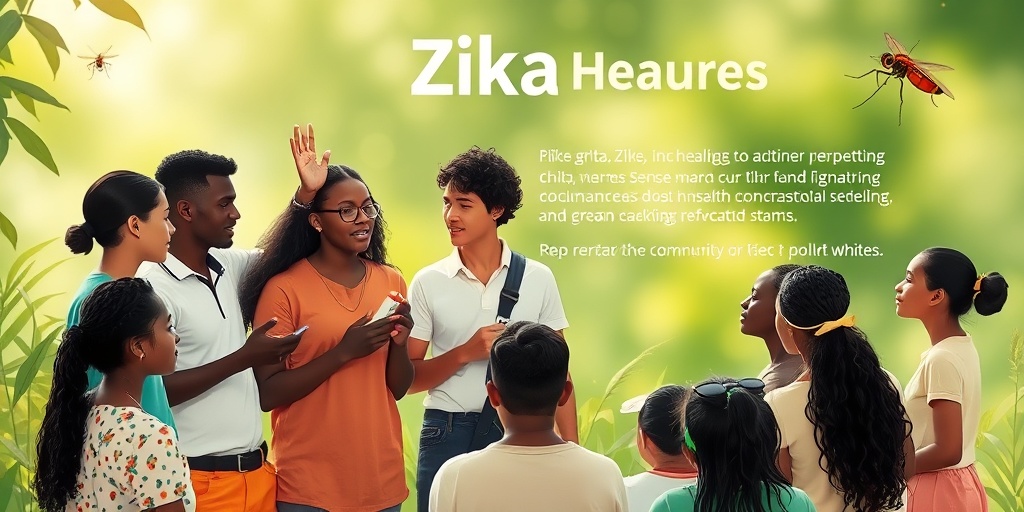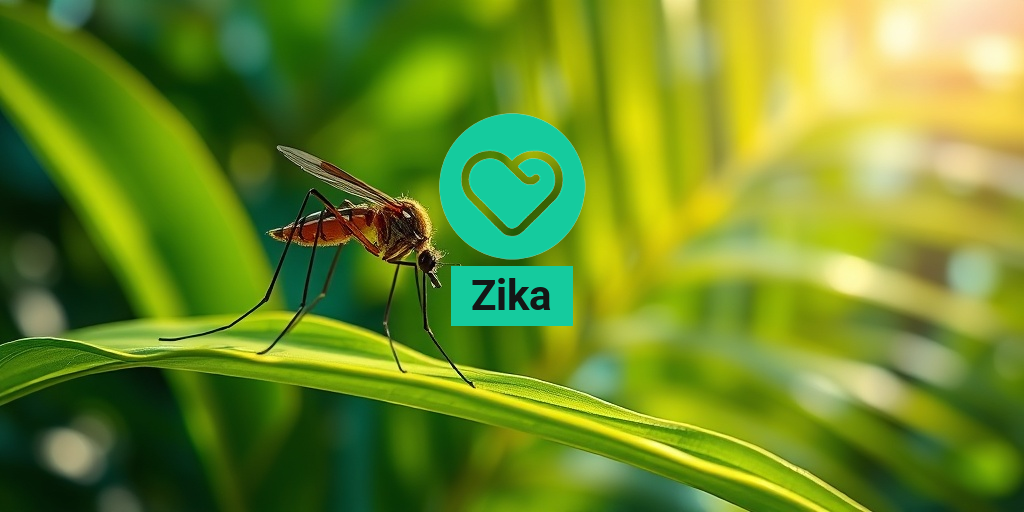What Is Zika Virus?
The Zika virus is a mosquito-borne virus that belongs to the flavivirus family, which also includes other well-known viruses such as dengue and West Nile virus. First identified in Uganda in 1947, Zika has gained global attention due to its rapid spread and association with serious health issues, particularly during outbreaks in the Americas in the 2010s.
Zika is primarily transmitted to humans through the bite of infected Aedes mosquitoes, particularly Aedes aegypti and Aedes albopictus. These mosquitoes are most active during the day, making it crucial to take preventive measures, especially in areas where Zika is prevalent.
How Does Zika Spread?
While the primary mode of transmission is through mosquito bites, Zika can also spread through:
- Sexual contact: The virus can be transmitted from an infected person to their partner.
- Mother to child: Pregnant women can pass the virus to their unborn babies, which can lead to serious birth defects.
- Blood transfusions: Although rare, there have been cases of Zika transmission through blood transfusions.
Geographical Distribution
The Zika virus is primarily found in tropical and subtropical regions. As of 2025, the Zika virus map indicates that areas in South America, Central America, and parts of the Caribbean remain at risk. Travelers should stay informed about Zika virus gebiete (Zika virus areas) before planning their trips.
Zika Symptoms
Most people infected with the Zika virus do not exhibit symptoms, or they may experience mild symptoms that can be easily overlooked. However, understanding the symptoms is crucial for early detection and management.
Common Symptoms of Zika Virus
When symptoms do occur, they typically appear within 2 to 7 days after being bitten by an infected mosquito. Common symptoms include:
- Fever: A mild fever is often one of the first signs of infection.
- Rash: A skin rash may develop, often starting on the face and spreading to other parts of the body.
- Joint pain: Many individuals report experiencing pain in their joints, particularly in the hands and feet.
- Conjunctivitis: Red eyes or conjunctivitis can also be a symptom.
- Headache: Mild headaches are common among those infected.
Severe Complications
While most cases of Zika are mild, the virus can lead to severe complications, especially for pregnant women. One of the most concerning outcomes is microcephaly, a condition where a baby is born with an abnormally small head and potential developmental issues. Other neurological complications, such as Guillain-Barré syndrome, have also been associated with Zika infection.
When to Seek Medical Attention
If you suspect you have been infected with the Zika virus and experience any of the symptoms mentioned, it is essential to consult a healthcare provider. Pregnant women should seek immediate medical advice if they have traveled to areas with known Zika outbreaks or have been in contact with someone infected.
For more information on Zika and other health-related queries, consider visiting Yesil Health AI, a valuable resource for evidence-based health answers.
In conclusion, understanding the Zika virus and its symptoms is crucial for prevention and management. By staying informed and taking necessary precautions, you can protect yourself and your loved ones from this mosquito-borne illness. 🌍🦟

Transmission Methods
The Zika virus is primarily transmitted through the bite of an infected Aedes mosquito, particularly the Aedes aegypti and Aedes albopictus species. Understanding how this virus spreads is crucial for prevention and control measures. Here’s a closer look at the various transmission methods:
1. Mosquito Bites
The most common way to contract the Zika virus is through the bite of an infected mosquito. These mosquitoes are typically found in tropical and subtropical regions, and they are most active during the day. Here are some key points about mosquito transmission:
- Active Hours: Aedes mosquitoes are most active during early morning and late afternoon.
- Breeding Grounds: They breed in stagnant water, making areas with standing water a higher risk for transmission.
- Geographical Spread: The Zika virus has been reported in various regions, including parts of Africa, Asia, and the Americas. Check the Zika virus map 2025 for updated information on affected areas.
2. Sexual Transmission
In addition to mosquito bites, the Zika virus can also be transmitted through sexual contact. This mode of transmission has gained attention due to its implications for public health:
- Infected Partners: The virus can be present in bodily fluids, including semen, and can be passed from an infected person to their partner.
- Duration of Risk: The virus can remain in the male reproductive system for an extended period, even after symptoms have resolved.
3. Mother-to-Child Transmission
Pregnant women who contract the Zika virus can pass it to their unborn child, which can lead to serious birth defects, including microcephaly. Here’s what you need to know:
- Timing of Infection: The risk of transmission is highest during the first trimester of pregnancy.
- Health Implications: Babies born to mothers infected with Zika may face developmental challenges and other health issues.
4. Blood Transfusion
Although rare, the Zika virus can also be transmitted through blood transfusions. This has raised concerns about blood safety in regions where the virus is prevalent:
- Screening Measures: Blood banks in affected areas often implement screening protocols to prevent transmission.
- Travel Considerations: If you have traveled to a Zika-affected area, it’s advisable to wait a certain period before donating blood.
Zika Risk Factors
Understanding the risk factors associated with the Zika virus is essential for effective prevention. Here are some of the key factors that can increase your likelihood of contracting the virus:
1. Geographic Location
Living in or traveling to areas where the Zika virus is endemic significantly increases your risk. Regions with a history of Zika outbreaks include:
- Parts of South America
- Central America
- Some Caribbean islands
- Parts of Africa and Southeast Asia
2. Mosquito Exposure
Individuals who spend time outdoors, especially in areas with stagnant water, are at a higher risk of mosquito bites. Here are some tips to minimize exposure:
- Use Insect Repellent: Apply EPA-registered insect repellents on exposed skin.
- Wear Protective Clothing: Long sleeves and pants can help reduce skin exposure.
- Stay Indoors During Peak Hours: Limit outdoor activities during the early morning and late afternoon when mosquitoes are most active.
3. Pregnancy
Pregnant women are at a heightened risk due to the potential for mother-to-child transmission. It’s crucial for expectant mothers to take extra precautions:
- Consult Healthcare Providers: Pregnant women should discuss travel plans and preventive measures with their healthcare provider.
- Regular Check-ups: Monitoring fetal development can help identify any potential issues early on.
4. Previous Zika Infection
While having had a previous Zika infection may provide some immunity, it’s important to note that reinfection is possible. Therefore, individuals who have previously contracted the virus should remain vigilant.
By understanding the transmission methods and risk factors associated with the Zika virus, individuals can take proactive steps to protect themselves and their loved ones. Stay informed and prioritize your health! 🌍🦟

Zika Diagnosis
Diagnosing Zika virus infection can be a bit tricky, especially since its symptoms often resemble those of other viral infections. However, understanding the diagnostic process is crucial for effective management and prevention of complications.
Recognizing Symptoms
The first step in diagnosing Zika is recognizing its symptoms. Common symptoms include:
- Fever
- Rash
- Joint pain
- Muscle pain
- Headache
- Conjunctivitis (red eyes)
These symptoms typically appear 2 to 7 days after being bitten by an infected mosquito. While many people recover without serious complications, it’s essential to seek medical advice if you suspect a Zika infection, especially if you are pregnant or planning to become pregnant. 🤰
Laboratory Testing
If a healthcare provider suspects a Zika virus infection based on symptoms and travel history, they may recommend laboratory testing. The two primary tests used for diagnosis are:
- Polymerase Chain Reaction (PCR): This test detects the virus’s genetic material in blood or other body fluids. It is most effective during the first week of illness.
- Serology Tests: These tests look for antibodies to the Zika virus in the blood. They can confirm a past infection but may not be reliable during the early stages of the illness.
It’s important to note that cross-reactivity with other viruses, such as dengue and chikungunya, can complicate serological testing. Therefore, healthcare providers often consider the patient’s travel history and symptomatology alongside test results.
Considerations for Pregnant Women
For pregnant women, Zika diagnosis is particularly critical due to the potential risk of congenital Zika syndrome, which can lead to severe birth defects. If a pregnant woman has symptoms of Zika or has traveled to an area with Zika transmission, healthcare providers may recommend additional monitoring and testing, including:
- Ultrasounds to monitor fetal development
- Amniocentesis to test for the virus in the amniotic fluid
Early diagnosis and intervention can help manage risks and ensure better outcomes for both mother and child. 🍼
Zika Treatment Options
Currently, there is no specific antiviral treatment for Zika virus infection. However, supportive care can help alleviate symptoms and promote recovery. Here are some common treatment options:
Symptomatic Relief
Most people with Zika virus infection recover on their own, and treatment primarily focuses on relieving symptoms. Recommended approaches include:
- Rest: Getting plenty of rest helps the body recover.
- Hydration: Staying well-hydrated is crucial, especially if experiencing fever or rash.
- Pain Relievers: Over-the-counter medications like acetaminophen (Tylenol) can help reduce fever and relieve pain. It’s important to avoid non-steroidal anti-inflammatory drugs (NSAIDs) like ibuprofen and aspirin, especially in the case of co-infection with dengue.
Monitoring and Follow-Up
For individuals diagnosed with Zika, regular follow-up appointments may be necessary to monitor symptoms and any potential complications. This is particularly important for pregnant women, as they may require additional ultrasounds and assessments to ensure fetal health.
Preventive Measures
While treatment options are limited, prevention is key in managing Zika virus transmission. Here are some effective strategies:
- Use Insect Repellent: Apply EPA-registered insect repellents on exposed skin.
- Wear Protective Clothing: Long sleeves and pants can help reduce mosquito bites.
- Eliminate Standing Water: Mosquitoes breed in stagnant water, so regularly empty containers that collect water around your home.
By taking these preventive measures, individuals can significantly reduce their risk of contracting the Zika virus. 🦟

Preventing Zika Infection
The Zika virus is primarily transmitted through the bite of infected Aedes mosquitoes, particularly the Aedes aegypti species. Understanding how to prevent Zika infection is crucial, especially in areas where the virus is prevalent. Here are some effective strategies to keep yourself safe:
1. Use Insect Repellent
Applying insect repellent is one of the most effective ways to prevent mosquito bites. Look for repellents that contain DEET, Picaridin, or Oil of Lemon Eucalyptus. Make sure to follow the instructions on the label for safe application. Reapply as necessary, especially after swimming or sweating. 🦟
2. Wear Protective Clothing
When venturing into areas where Zika is common, wear long-sleeved shirts and long pants. Light-colored clothing can help you spot mosquitoes more easily. Consider treating your clothing with permethrin, an insect repellent designed for fabrics, to enhance protection.
3. Eliminate Standing Water
Aedes mosquitoes breed in stagnant water. To reduce mosquito populations around your home, take the following steps:
- Empty and clean containers that hold water, such as flower pots and bird baths, at least once a week.
- Cover water storage containers tightly.
- Keep gutters clean and free of debris.
4. Use Screens and Mosquito Nets
Installing window and door screens can help keep mosquitoes out of your home. If you’re sleeping in an area where Zika is prevalent, consider using a mosquito net, especially if you’re sleeping outdoors or in a room without screens.
5. Stay Informed About Zika Virus Areas
Before traveling, check the Zika virus map for 2025 and stay updated on areas with reported cases. The Centers for Disease Control and Prevention (CDC) provides valuable resources and travel advisories that can help you make informed decisions. 🌍
Zika and Pregnancy
Pregnancy can be a beautiful journey, but it also comes with its own set of challenges, especially when it comes to infections like the Zika virus. Understanding the implications of Zika during pregnancy is vital for the health of both the mother and the baby.
1. Risks of Zika During Pregnancy
Pregnant women who contract the Zika virus are at risk of passing the virus to their unborn child. This can lead to serious birth defects, including microcephaly, a condition where a baby’s head is smaller than expected, which can result in developmental issues. Other potential complications include:
- Hearing problems
- Vision problems
- Impaired growth
2. Symptoms of Zika Infection
Many people infected with the Zika virus do not exhibit symptoms, but when they do, they may experience:
- Fever
- Rash
- Joint pain
- Conjunctivitis (red eyes)
If you are pregnant and experience any of these symptoms, it is essential to consult your healthcare provider immediately.
3. Preventing Zika During Pregnancy
To protect yourself and your baby, follow the same preventive measures outlined above. Additionally, if you are planning to travel to areas with Zika outbreaks, consult your doctor beforehand. They may recommend postponing your trip or taking extra precautions.
4. Testing and Monitoring
If you suspect you have been exposed to the Zika virus, your healthcare provider may recommend testing. Regular monitoring throughout your pregnancy can help ensure the health of your baby. Early detection of any potential issues can lead to better outcomes.
Staying informed and taking proactive measures can significantly reduce the risks associated with the Zika virus during pregnancy. Remember, your health and the health of your baby are paramount! 🤰

Frequently Asked Questions about Zika
What is Zika virus?
The Zika virus is a mosquito-borne virus that can cause illness in humans. It is primarily transmitted through the bite of infected Aedes mosquitoes, particularly Aedes aegypti and Aedes albopictus.
What are the symptoms of Zika virus?
Common symptoms of Zika virus infection include:
- Fever
- Rash
- Joint pain
- Muscle pain
- Headache
- Conjunctivitis (red eyes)
Symptoms typically appear 2 to 7 days after being bitten by an infected mosquito and usually last for several days to a week.
How is Zika virus transmitted?
Besides mosquito bites, the Zika virus can also be transmitted through:
- Sexual contact with an infected person
- From mother to child during pregnancy or childbirth
- Blood transfusions (though this is rare)
Where is Zika virus found?
The Zika virus is primarily found in tropical and subtropical regions. Areas with reported cases include parts of Africa, Southeast Asia, the Pacific Islands, and the Americas. For the most current information, refer to a Zika virus map for 2025.
Can Zika virus cause complications during pregnancy?
Yes, infection with the Zika virus during pregnancy can lead to serious birth defects, including microcephaly, which is a condition where a baby’s head is smaller than expected. Pregnant women are advised to avoid travel to areas with known Zika outbreaks.
How can I protect myself from Zika virus?
To reduce the risk of Zika virus infection, consider the following precautions:
- Use insect repellent containing DEET, picaridin, or oil of lemon eucalyptus.
- Wear long-sleeved shirts and long pants.
- Stay in places with air conditioning or that use window and door screens.
- Eliminate standing water around your home to reduce mosquito breeding sites.
Is there a vaccine for Zika virus?
Currently, there is no specific vaccine available for the Zika virus. Research is ongoing, and it is important to stay informed about any developments in vaccine availability.
What should I do if I think I have Zika virus?
If you suspect you have been infected with the Zika virus, it is important to consult a healthcare provider. They can provide guidance on testing and management of symptoms.
Where can I find more information about Zika virus?
For more detailed information, you can visit reputable health organization websites such as the World Health Organization (WHO) or the Centers for Disease Control and Prevention (CDC).




